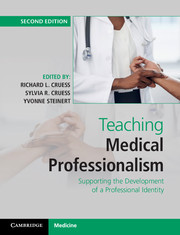Foreword
Published online by Cambridge University Press: 05 April 2016
Summary
This is a report from a movement. It presents ideas, evidence, and guidance for those interested in using the most recent advances in knowledge about learning and human development to enhance medical education's ability to form competent, caring, and publicly responsible physicians. Like all genuine social movements, this new approach is emerging from experience and experiment, in this case by the medical educators involved in articulating a new way of understanding their mission. For that reason, it is an optimistic book. The voices are those of many of the leaders, theorists, and experienced practitioners of the new approach who have found in it a promising way to confront the challenges of a new era in medicine.
Though it is not formally a manifesto, this book makes a strong case that professional identity formation needs to become the central focus in educating tomorrow's physicians. In a time when medicine in general, and medical education in particular, finds itself under great stress, the book provides a way in which the profession can respond constructively through a new focus on the professional identity of physicians. The book is also not a how-to manual. But it does provide a thorough review of the learning science and social scientific insights that underlie the changes in training that it calls for, while vividly exemplifying these new educational practices in functioning programs. Neither is this a policy document, though it ought to provide persuasive evidence to support bold proposals to implement the vision of medical education that the book sets out, one that can sustain physicians’ commitment to high standards of practice over an entire career.
Since the publication of the first edition of Teaching Medical Professionalism in 2009, medical education in the United States and Canada has seen an upsurge in efforts to ensure that physicians at all stages of their training encounter a learning environment that embodies the practice of medicine at its best. “Professionalism” is the term that is often used to encapsulate the complex but utterly essential features of such high-performance practice that is grounded in continuing improvement, focused on the needs of patients, and guided by a sense of social responsibility shared between the profession and the public it is meant to serve.
- Type
- Chapter
- Information
- Teaching Medical ProfessionalismSupporting the Development of a Professional Identity, pp. ix - xviPublisher: Cambridge University PressPrint publication year: 2016

